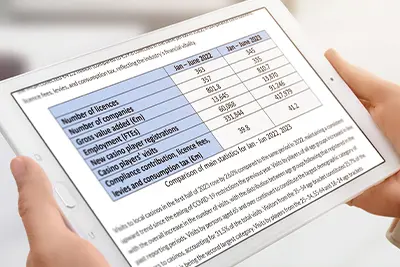Maltese gaming industry continues to positively impact the country’s economy through its role of a key driver of economic growth and innovation. The gaming industry in Malta contributed EUR 810.7 million, or around 9.5%, to the country’s Gross Value Added (GVA) during the first half of 2023. Over the same period, the industry’s overall contribution to the national economy accounted for 12.2% to testify about its crucial impact on the economic outlook of the Maltese economy.
Reaching 12.2% Stake in Malta’s Economy
 The argument is further supported by the fact that the gaming industry growth in the first half of 2023 reached around 1.1% higher level than in the same period of 2022. By June 30, 2023, the Maltese Gaming Authority (MGA) approved licenses to 335 online and land-based companies following the 2022 figure standing at 357 MGS-license companies to underline the industry’s stability and a continuous contribution to Malta’s economy.
The argument is further supported by the fact that the gaming industry growth in the first half of 2023 reached around 1.1% higher level than in the same period of 2022. By June 30, 2023, the Maltese Gaming Authority (MGA) approved licenses to 335 online and land-based companies following the 2022 figure standing at 357 MGS-license companies to underline the industry’s stability and a continuous contribution to Malta’s economy.
In the same period of 2023, the regulator collected EUR 41.2 million in license fees and compliance levies. When compared to EUR 39.8 million collected by MGA in the first half of 2022, it is evident that the industry has kept the momentum and maintained financial resilience. Also, the industry’s GVA increased from EUR 801.8 million in H1 2022 to EUR 810.7 million in the first half of 2023 to showcase a 1.1% growth achieved by the industry on a year-over-year basis.
Expecting Further Growth in 2024
The growth was propelled by 26% increased visits to local casinos in the first half of 2023.The gaming sector therefore directly contributed around 9.5% to the country’s economy and is expected to continue growing at a slightly slower pace. In 2024, 74% of online gaming operators expect further revenue growth while 60% of them anticipate increased employment. On the contingency side, operators generally expect higher operating costs and divergent regulatory actions requiring quick adaptation.
Commitment to Innovation and Social Responsibility
The industry promotes transparency and responsible gaming and considers the integration of environmental, social, and governance (ESG) principles essential for long-term profitability. Also, the utilization of emerging technologies enables the gaming sector to maintain customer interest through innovative integrations of traditional and other games. For example, innovative products like digital receivables and tokens are increasingly included in transactions and supported by the regulatory body.
As a result, Malta’s gaming industry expects positive market trends in the forthcoming period and continues to adjust the established gaming landscape to the evolving regulatory framework and emerging market trends. Overall, the sector maintains its stability and continues to drive Maltese economy.
Source: “MGA Interim Report 2023: Malta’s gaming industry maintains strong economic contribution’’. SiGMA. December 2023.




